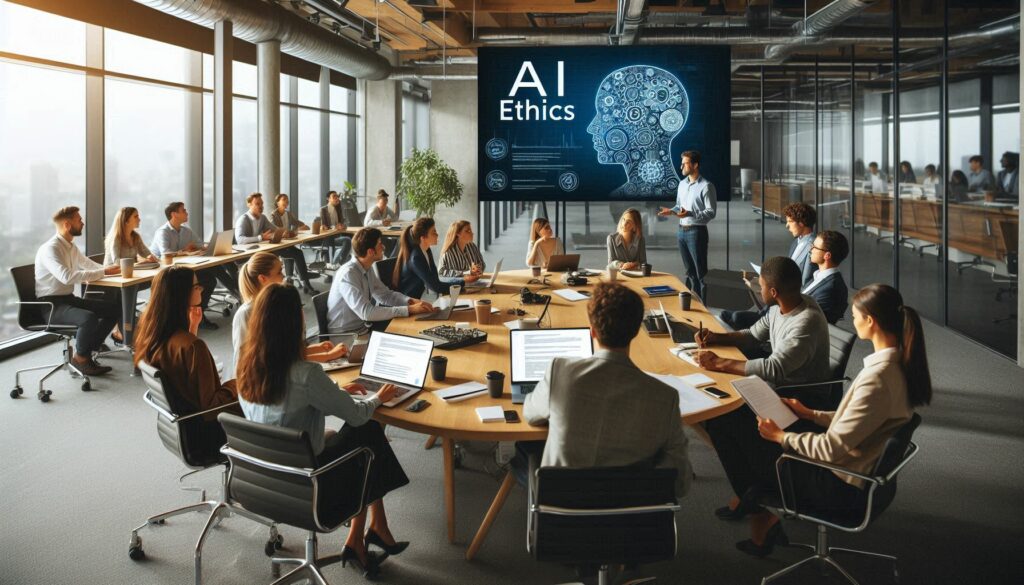
AI CERTS
1 month ago
AI Ethics Certification: A Key to Responsible AI Adoption
As artificial intelligence (AI) increasingly shapes our digital world, the importance of AI ethics has become paramount. From automated decision-making to facial recognition systems, ethical dilemmas surrounding fairness, accountability, and transparency continue to arise. To address these challenges, AI ethics certification programs are gaining traction. These certifications ensure that professionals and organizations adopt responsible AI practices, balancing innovation with integrity.

In this article, we will explore the growing need for AI ethics certification, the best programs available, and the value they offer to individuals and enterprises in today’s tech-driven economy.
The Importance of AI Ethics
Artificial intelligence is revolutionizing industries by streamlining processes and improving productivity. However, the widespread deployment of AI systems has also led to issues such as:
- Bias in algorithms: Discriminatory patterns in AI models impacting marginalized groups.
- Lack of accountability: When AI systems malfunction or make incorrect decisions, pinpointing responsibility can be challenging.
- Data privacy concerns: AI-driven systems often handle vast amounts of personal data, raising questions about misuse and security.
AI ethics certification programs aim to bridge these gaps by equipping professionals with frameworks and guidelines for building responsible AI solutions.
AI ethics is not just a technical discipline but a moral imperative. Organizations that prioritize ethics foster trust and long-term success while minimizing risks. In the next section, let’s explore the top certifications available for mastering this critical skill.
AI Ethics Certification vs. Governance Programs: What’s the Difference?
AI ethics certifications focus on teaching professionals to integrate fairness, accountability, and transparency in AI projects. Meanwhile, AI governance programs are designed for executives to align AI systems with regulatory compliance.
| Feature | AI Ethics Certification | AI Governance Program |
| Target Audience | Data scientists, developers | Business leaders, policymakers |
| Focus | Bias mitigation, fairness | Regulations, compliance |
| Examples | AI CERTs Ethics Program | MIT Sloan AI Governance |
This section helps professionals choose the right path for their career needs.
Best AI Ethics Certifications in 2024
Some reputable organizations now offer AI ethics certifications. These programs provide structured learning, hands-on experience, and recognition that signals competence in responsible AI practices. Below are the most sought-after AI ethics certifications:
1. AI CERTs – AI+ Ethics Certification
The AI Ethics certification from AI CERTs provides a comprehensive curriculum on the ethical implications of AI, focusing on fairness, bias mitigation, and data transparency. The course covers:
- Practical guidelines on ethical AI development.
- Methods to identify and resolve biases in AI models.
- Legal frameworks governing AI ethics, including GDPR and AI regulatory policies.
Link: AI+ Ethics
2. The Ethical AI Certification by CertNexus
CertNexus offers a globally recognized credential that focuses on designing ethical AI frameworks. Key features of the certification include:
- Training on ethical data sourcing and transparency.
- Case studies highlighting ethical dilemmas in AI projects.
- Compliance with industry regulations and best practices.
Link: CertNexus
This certification targets professionals working in data science, engineering, and AI governance roles.
3. AI Ethics and Governance Certification – MIT Sloan
MIT Sloan School of Management offers an advanced course on AI ethics and governance. The program blends theory with practical insights, providing participants with the tools to implement ethical AI strategies in real-world scenarios. It covers:
- Techniques to align AI goals with human values.
- Guidelines for AI governance and regulatory compliance.
- Tools to audit AI systems for bias and fairness.
Link: MIT Sloan
The Growing Demand for AI Ethics Professionals

The rise of AI has created a surge in demand for professionals with expertise in AI ethics. As governments introduce new regulations on AI usage, companies are seeking certified individuals to ensure compliance. Here’s why AI ethics certification is becoming essential:
1. Regulatory Compliance
With AI-related policies such as the European Union’s AI Act coming into effect, organizations are under pressure to meet compliance requirements. Certified professionals can navigate these legal frameworks effectively, reducing the risk of penalties.
2. Mitigating Reputational Risks
Unethical AI practices can severely damage an organization’s reputation. For example, biased algorithms in recruitment software can lead to legal action and public backlash. AI ethics experts help design systems that are fair, transparent, and aligned with societal values.
3. Building Trust with Consumers
Consumers are becoming increasingly aware of the ethical implications of AI. Companies that prioritize ethics through AI ethics certification build trust with their audience, gaining a competitive edge in the market.
Certified professionals are now instrumental in shaping responsible AI ecosystems, ensuring sustainable innovation.
How AI Ethics Certifications Benefit Professionals
Obtaining an AI ethics certification offers several advantages for individuals looking to advance their careers:
- Career Advancement: Certified professionals are in high demand across various industries, from tech firms to healthcare.
- Higher Salaries: Certifications in ethical AI demonstrate specialized skills, often leading to higher salaries and leadership roles.
- Networking Opportunities: Many certification programs provide access to professional networks, connecting participants with thought leaders in AI ethics.
As the AI landscape evolves, certified professionals will play a critical role in ensuring technology serves humanity responsibly.
A Day in the Life of an AI Ethics Officer
AI ethics officers are the gatekeepers of responsible AI development. Their day involves:
- Analyzing algorithms to detect biases.
- Collaborating with data teams to ensure fairness in datasets.
- Creating AI policies that align with industry standards.
Fun Fact: Large companies like Google and Microsoft now have dedicated AI ethics teams to oversee their operations.
Case Studies: Successful Implementation of AI Ethics
1. IBM’s Ethical AI Initiative
IBM has integrated AI ethics principles across its product development lifecycle. Through initiatives like the AI Fairness 360 Toolkit, the company ensures its algorithms are unbiased and transparent. Certified AI ethics professionals lead these efforts, helping IBM maintain its reputation for responsible innovation.
2. Google’s Approach to Ethical AI
Google established its AI ethics board to address ethical challenges in machine learning. Certified experts within the company work to ensure that AI models comply with privacy laws and mitigate potential biases in their algorithms.
Both IBM and Google demonstrate how organizations that invest in ethical AI gain a competitive edge while avoiding pitfalls associated with unethical practices.
In the next section, we will look at how businesses are integrating AI ethics certification into their hiring processes.
AI Ethics Certification: A Game-Changer for Businesses
Many organizations are now incorporating AI ethics certifications into their hiring requirements and training programs. Here’s how businesses benefit:
- Enhanced Decision-Making: Certified employees bring valuable insights into ethical AI strategies.
- Compliance-Driven Innovation: Companies avoid legal risks by developing AI solutions aligned with regulatory frameworks.
- Improved Team Dynamics: Certified professionals foster a culture of accountability and transparency, strengthening team dynamics.
According to a report by PwC, organizations that prioritize AI ethics in their strategies are more likely to experience long-term success and sustainable growth.
Career Paths with AI Ethics Certifications
Certified professionals in AI ethics have access to exciting and growing career opportunities. Here are some roles you can explore:
- AI Ethics Consultant
- Advise organizations on developing and maintaining ethical AI systems.
- Algorithm Auditor
- Conduct audits to detect biases and ensure AI transparency.
- Compliance Officer for AI
- Monitor AI deployments to ensure compliance with ethical and legal standards.
Salary Potential: Certified professionals can expect salaries between $80,000 to $120,000, depending on their role and industry.
Future Trends in AI Ethics and Certification

The future of AI ethics certification is set to grow as new technologies emerge. Here are some key trends to watch:
- Integration with AI Governance Programs: Companies are increasingly aligning AI ethics certifications with governance frameworks to meet compliance needs.
- Focus on Explainability: Future certifications will emphasize explainability in AI systems, making algorithms more transparent and understandable.
- Expansion of Certifications to Niche Areas: Certifications will evolve to cover niche domains such as healthcare AI ethics and ethical considerations in autonomous vehicles.
These trends highlight the need for continuous learning and upskilling through AI ethics certification programs.
Conclusion
AI ethics certification has become a pivotal factor in shaping the responsible deployment of artificial intelligence. With AI systems permeating every aspect of society, individuals and organizations must adopt ethical frameworks to mitigate risks and foster trust. Certifications like those from AI CERTs, MIT Sloan, and CertNexus empower professionals to navigate complex ethical challenges confidently.
Looking to master AI ethics and stand out in your career?
Get certified with AI CERTs AI+ Ethics Certification to enhance your skills in responsible AI! Stay ahead of the curve with the knowledge and credentials that matter.